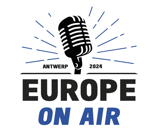In the Blended Intensive Programme Europe on Air students from six partner institutions from different parts of Europe prepare, produce and analyse radio programmes, using interactive and social media platforms. The partners will multilaterally give feedback on each other’s journalistic activities and radio formats, from their angle and speciality. Central theme of all radio products is European policy on current topics.
The partners are:
Universidad CEU San Pablo, Madrid
Haaga-Helia University of Applied Sciences, Helsinki
FHWien der WKW, Vienna
Sofia University St.Kl. Ohridski, Sofia
AP University of Applied Sciences & Arts, Antwerp
Georgian Institute of Public Affairs, Tbilisi
Objectives
- All journalism training institutes involved are trying to find a way to deal with new media and the role of journalism in the future. With this BIP we want to develop innovative practices in journalism training by multinational cooperation on finding innovative, interactive radio formats for university students.
- Thematic area: European policy on innovation. Each partner will develop a different angle of this theme.
- Develop multicultural awareness on differences in approach.
- Discover new ways to produce good scenarios and forms. An objective way of looking at new media and interactivity and accountability will be developed.
Target group
All university students from the partner institutes are the listeners of the radio programmes. Ultimately the target group exists of all university students from Europe who can listen and interact to the online radio programmes.
Main activities and expected outputs
After the research phase and production and analysis of pilots, students work in internationally mixed groups during the BIP live week in order to produce radio programmes following a certain format and with particular attention to the European policy.
There are technical and thematic workshops by staff members of the partners schools and experts and students will visit institutes in order to interview European experts.
Together with their coaches, students study the tense relation between old and new approaches in European radio stations. They will conclude together where European radio innovation is going to. Preferably this would result in radio programmes about different subthemes.
Learning outcomes
– Students gain interactive media competences.
– Students learn about European policy and approaches.
– Students are aware of the need for constant innovation in journalism and society in general.
